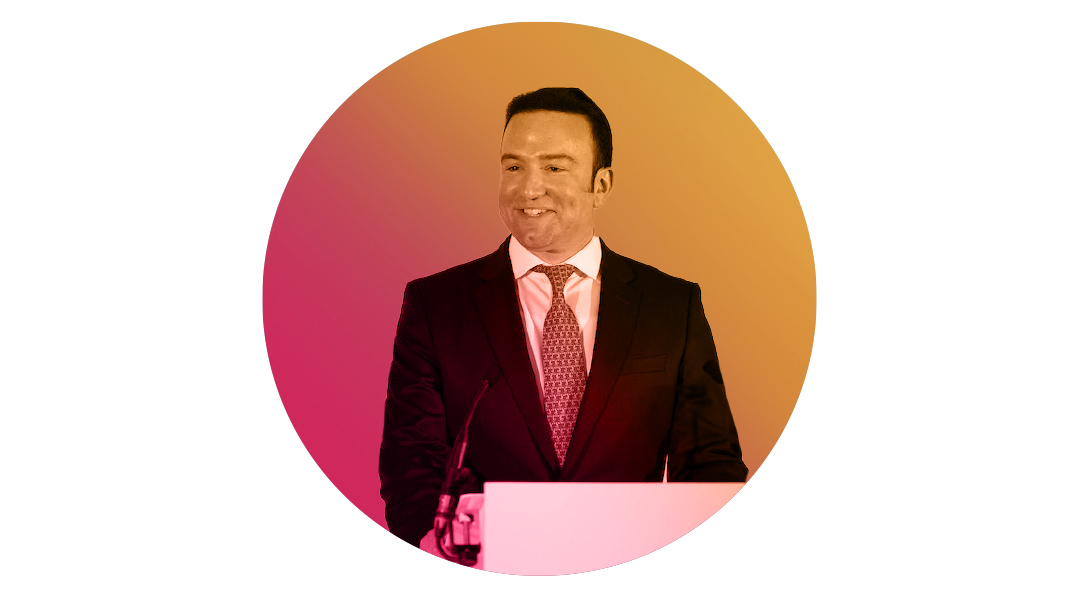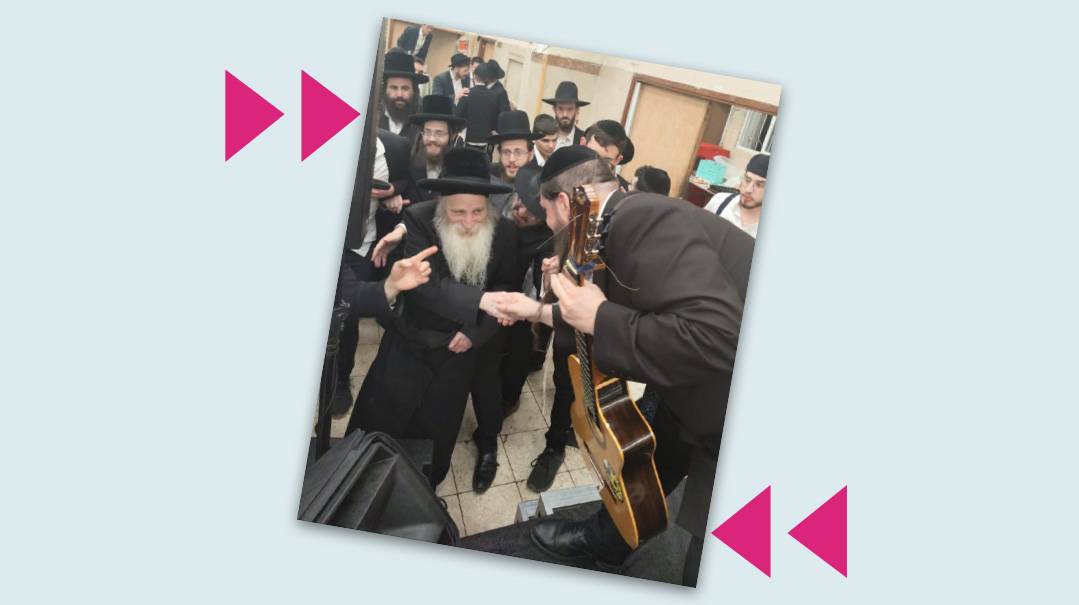Mood Mix with Rabbi Benjy Morgan
| November 21, 2023“Shir Lamaalos (Esa einai… ezri mei’im Hashem). It’s a song of longing, and also one of hope”

Since performing on the Gateshead Boys Choir’s Chaim Shel Tovah album almost 30 years ago, RABBI BENJY MORGAN, CEO of the Jewish Learning Exchange (JLE), hasn’t stopped singing. A graduate of Brisk and the Jerusalem Kollel, this director of London’s longstanding kiruv hub who is “passionate about educating the next generation about Judaism” is an enthusiastic regular baal tefillah as well, and has sung at hundreds of chuppahs of JLE members and alumni.
WHAT HAVE YOU BEEN SINGING IN THESE CHALLENGING DAYS?
We have a kumzitz at the JLE every Thursday night, and the first week after Succos it was difficult to even choke out the words of “Acheinu Kol Beis Yisrael.” Since then, we’ve been singing “Ve’afilu Behastarah Shebesoch Hahastarah,” about how Hashem is with us even when He is hidden under layers of concealment. And with less frum audiences, “Tov Lehodos” always goes down well, with its reference to “emunascha baleilos — faith in the night.” We had our kumzitz streamed to 15,000 listeners one week via the London Jewish News, as we were joined by Assaf Flumi’s orchestra, who came and did an amazing free gig to be mechazek of Klal Yisrael.
MY MOST REQUESTED CHUPPAH SONG
I like to sit down with the chassan and kallah before their wedding and talk them through the meaning of all the chuppah songs, explaining the words and what they represent. Ohad’s “Yehi ratzon … veyitein lecha banim” is very meaningful.
MY FAVORITE ENGLISH SONG
MBD’s “Lonely People.” One thing I’ve learned is that people don’t realize how lonely they are or how lonely others are. This song resonates because it recognizes a very real issue. I think music can be a help in relieving this loneliness.
WORDS THAT GET ME EVERY TIME
I love the Hallel section of Mah Ashiv LaHashem. It expresses our great gratitude to Hashem, and the words, “nedarai laHashem ashaleim — I will pay my vows to Hashem” remind us of the promises we made to Him, like those things we said and felt on Rosh Hashanah and Yom Kippur. When I sing this on Rosh Chodesh — using Rabbi Chait’s vintage Kol Salonika tune — I think of fulfilling my promises and being the person I intended to be on the Yamim Noraim.
MY FIRST RECORDING EXPERIENCE
When we recorded Chaim Shel Tovah, there were only seven of us in the Gateshead Boys Choir (the community was really small!). It was 1994, and the ability to digitally copy the track and paste it on top of itself wasn’t there, so in order to sound like a large choir, we recorded the entire song five times, and the harmonies twice, which took us a few days. If you listen, you can hear 35 voices. But the effort paid off — the title song went to the number one spot in Country Yossi magazine’s music bestseller list.
WHY MUSIC UNITES PEOPLE
When you talk, you can contradict each other, but when singing, you harmonize. It just has the power to transcend all differences and draw people together. Last Friday night, we sang “Acheinu” after davening. There was a new guy at the back of the room, crying, so I went over and asked him why. He replied that he had not done anything Jewish for ten years, since his bar mitzvah. He grew up unaffiliated in East London and his social circle was non-Jewish. Suddenly, they were all going to pro-Palestinian marches, and he was left bewildered and isolated. He mentioned this to someone who suggested that he go along to JLE on Golders Green Road, and here he was. The moving song had just broken some inner barrier, and he has been coming along to put on tefillin every day this week.
A JEWISH MUSIC ARTIST I MOST CONNECT TO
I’ve been a huge fan of Abie Rotenberg since I was a kid, and nowadays I’m very connected to Ishay Ribo’s music, too. They have something in common, I think, in that they both successfully express genuine, deep feelings in lyrics and compose music that is a perfect fit for those expressions. I sang with Ishay at an Olami conference in New York, and his humility is striking. With all his music, he’s just one of the people.
THE SONG I CAN’T STOP SINGING THIS SEASON
“Shir Lamaalos (Esa einai… ezri mei’im Hashem).” It’s a song of longing, and also one of hope.
MY GO-TO LECHA DODI NIGGUN
There is no such thing — I have to read the room when I get there. I’m not a chazzan, but a shaliach tzibbur, representing the people. Sometimes people need an uplift, and I might use the tune of “Shiru LaMelech,” while at other times, the mood might be more serious, or maybe it’s a more yeshivish crowd, and Carlebach’s “Kah Ribbon” can work. During Covid, we would stream an early Kabbalas Shabbos for the public, and had 10,000 people watching.
A SONG THAT HAS AMAZING, ORIGINAL VOCAL ARRANGEMENTS
There are a few, but my favorite is Carlebach’s cantorial “Mimkomcha.”
A PASUK AND A TUNE THAT ARE A PERFECT MATCH
MBD’s “Od Yeishvu.” You can picture the children playing in the streets of Yerushalayim. And the longing for that time is beautifully expressed in the music.
MY MUSICAL DREAM
I would like to put out my own “Gam Ki Eilech” with original English lyrics. A few years ago, I had an untreated infection that quickly spread from a tooth to the brain. An attending physician pronounced that I had only a five percent chance of survival, but baruch Hashem, surgery was successful and I recovered. The song is about Dovid Hamelech’s principle, “Even if I walk in the valley of the shadow of death,” even if the odds are stacked against us, Hashem is with us, and the statistics make no difference.
A SONG THAT HAS GONE OUT OF STYLE BUT I WISH WE COULD BRING BACK
“Racheim.” It was so popular that it became overused, and no one wants to sing it anymore. I would love to, though — it has so much heart and soul. True, you have to have patience to sing it, because “racheim” gets repeated a few times, but that’s part of its pensive beauty. Maybe that’s another reason people don’t want to sing it — who has patience? Today everybody wants something quick.
A SONG THAT TAKES ME TO A DIFFERENT TIME AND PLACE
“Bilvavi” takes me back to my yeshivah days in Passaic. It was a powerful song back then, and until today, I find that if people know it, they love to sing it. It also reminds me of when I was once taking part in a kiruv shabbaton, and a woman started to sing that song. There was a veteran mekarev there, and he complimented her, “You have such a beautiful voice! Why don’t we sing ‘Kad Yasvin’ now?” He immediately started “Kad Yasvin,” and the crowd joined him, but he had guessed right, the woman didn’t know it.
(Originally featured in Mishpacha, Issue 987)
Oops! We could not locate your form.






